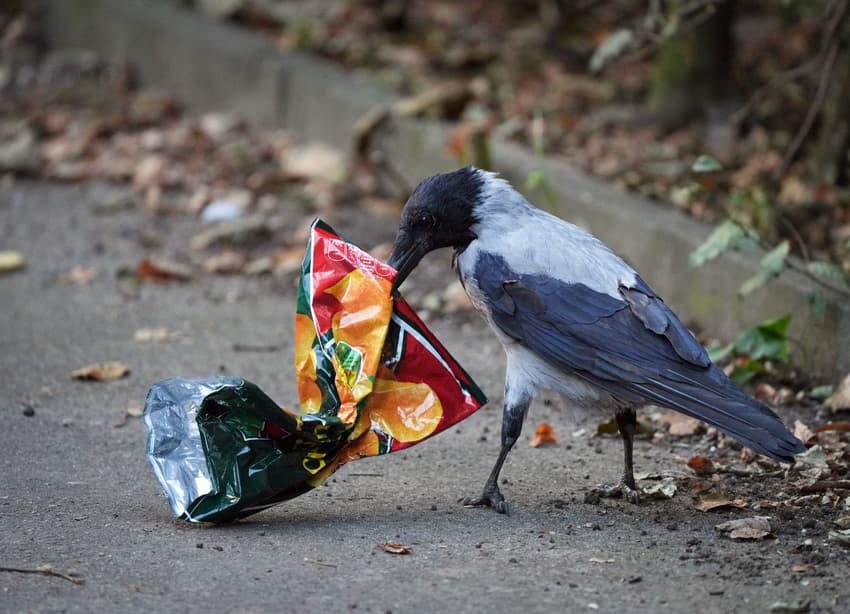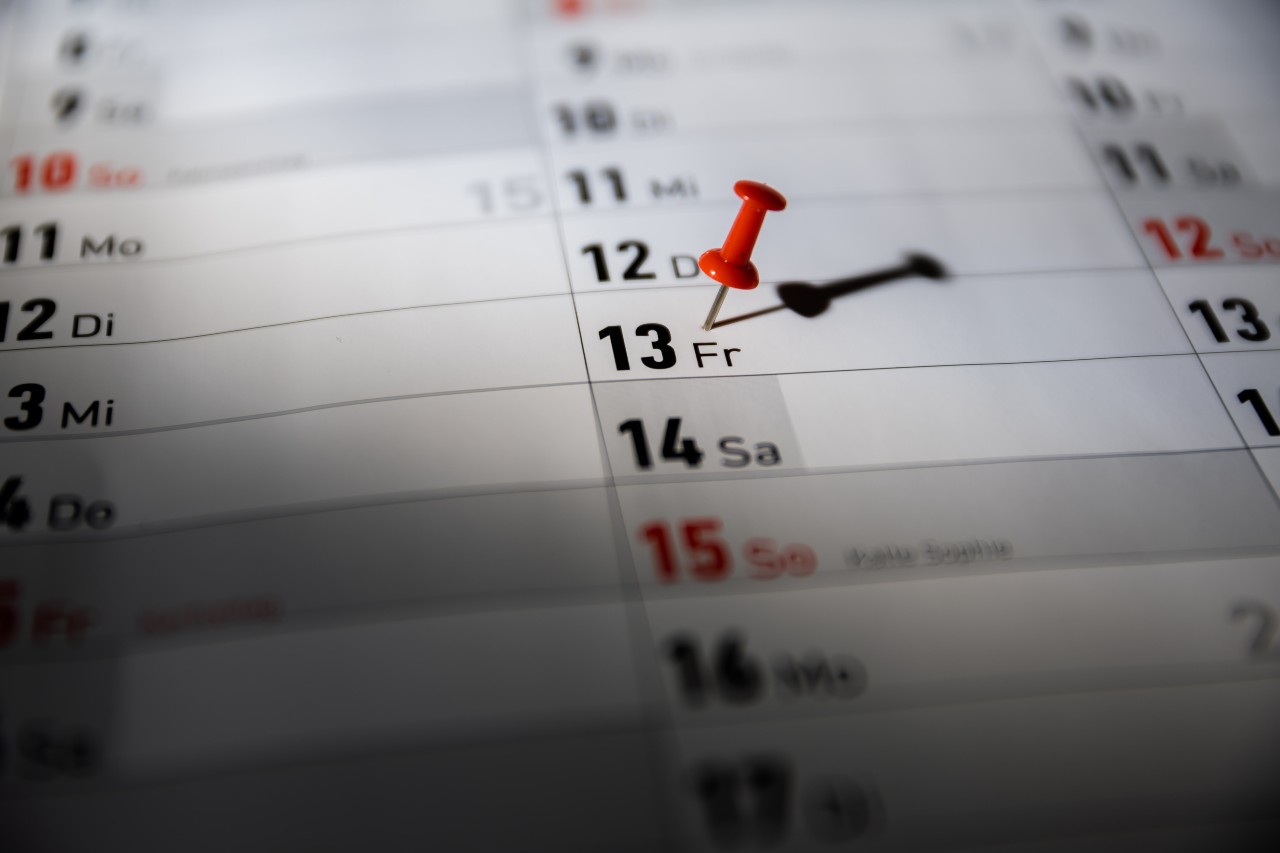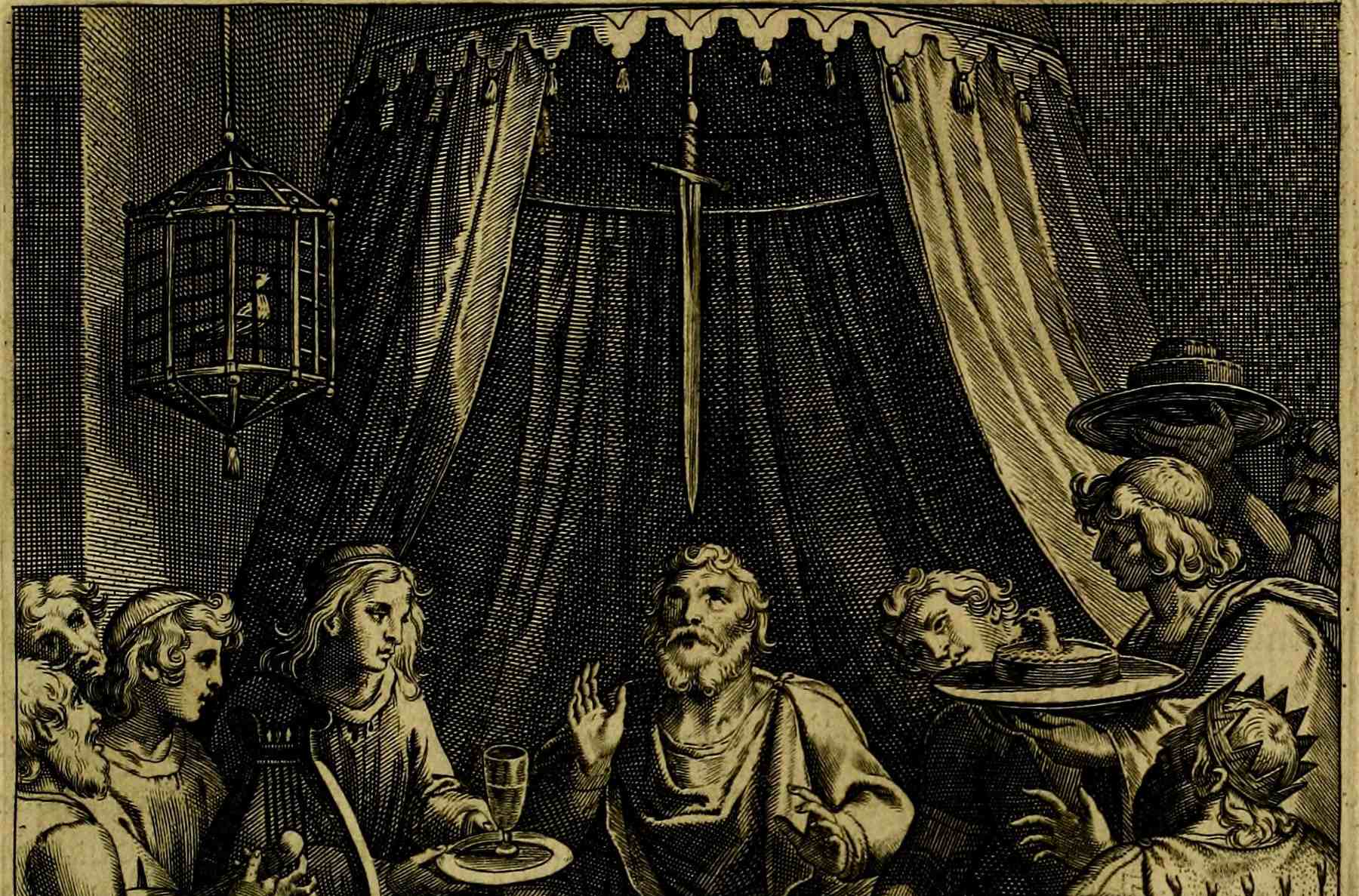Fettnäpfchen to Pechvogel: What's the story behind 'unlucky' German phrases?

For superstitious Germans, Friday 13th is a time to stay home if you want to avoid stepping in a puddle or busting a tyre. But if misfortune does strike, there are plenty of German idioms that deal with these unlucky situations.
As Halloween approaches at the end of October and the nights start closing in sooner, it's a time of year when many people's thoughts turn to the darker side of life. And on Friday 13th, those of us with a superstitious mind may feel inclined to be that little bit more careful while we're out and about.
Traditionally, this is a date with an unheimlich - or rather creepy - reputation. It's a day known for bringing bad luck - a connection that is largely believed to stem back to the story of Jesus' Last Supper in the Bible.
During the Last Supper, which happened on a Thursday, 13 people - Jesus and his 12 apostles - were seated at the table. Jesus was arrested later that night and was crucified on the Friday. The crucifixion therefore brought together this day of the week with the unlucky number 13.
Though not all Germans believe in the morbid power of Friday 13th, the German language does offer a wealth of sayings that deal with misfortune and impending doom. Here are our five picks and the stories behind them.
READ ALSO: Friday the 13th: Eight strange superstitions that Germans hold dearly
Vom Regen in die Traufe
If you start with a minor bit of a bad luck and end up in a far worse situation, you might want to tell people you've gone "vom Regen in die Traufe" - or from the rain into the eaves. This analogy has apparently been used in Germany to describe such situations since the 17th century.
If it doesn't sound too bad at first, it's worth remembering that the eaves - or Traufe - refer to the bottom of the roof where rain collects and spills off. In fact, it comes from the Old German word 'trouf', which means 'dripping'. So if you find yourself sheltering from a storm under the eaves, you might just find yourself hit by a fountain of cascading water and far wetter than you were to begin with.
In English, we have a similar phrase, but with a far more hellish connotation: jumping from the frying pan into the fire.
Pech haben
Whether it's a Pechvogel (unlucky person), a Pechsträhne (streak of bad luck), or being 'vom Pech verfolgt' (followed by misfortunate), German is littered with phrases that deal with the subject of 'Pech'. On its own, you may recognise Pech as meaning bad luck, but you may not be aware that the word literally means tar.

A calendar with Friday 13th marked with a pin. Photo: picture alliance/dpa | Christoph Soeder
So how exactly did this gooey black liquid come to be associated with the worst of misfortunes? Many believe it relates to the world of hunting. In the Middle Ages, people would rub tar on tree branches for birds to get stuck on. Any unsuspecting fowl caught in this way came to represent a figure of misfortune, which is where the German phrase 'Pechvogel' likely comes from.
Another less likely explanation comes from Germany's beer-making traditions. In order to store beer over longer periods, barrels used to be coated with tar on the inside - meaning some unlucky pub-goers may well find some of the black liquid floating in their drink.
READ ALSO: German word of the day: Der Pechvogel
Ins Fettnäpfchen treten
Whether you've blabbed about a surprise birthday party or accidentally offended a work colleague, Germans have a phrase to describe these silly blunders: stepping in a bowl of fat.
In recent years, the fat-bowl - or Fettnäpfchen - in itself has come to signalise a blunder or a piece of bad luck, in a similar way to the French phrase 'faux pas'.
According to the chemist and author Georg Schwedt, the metaphor dates back to a time when farmhouses would often keep a bowl of fat near the front door in order to clean and preserve wet shoes. If people weren't careful, however, the bowl could easily be stepped on or kicked off, spreading stubborn grease stains all over the floor.
In English, incidentally, clumsy people also "put their foot in it". In this case, however, the unpleasant substance you step in is left up to the imagination.
Damoklesschwert
English speakers may well recognise this reference to the 'Sword of Damocles' - an idiom indicating that a streak of luck or happiness may soon end in misery.
The expression has its roots in a story by the Roman writer Cicero that has been handed down from antiquity. In it, the courtier Damocles praises the tyrant Dionysius of Syracuse as the most fortunate and happiest king.

Damocles' sword. Photo. Wiki Commons
Dionysus agrees to swap places with his courtier, but has a sword hung above the throne, hanging only by a horse's hair. This sword comes to symbolise a constant threat to Damocles' present happiness.
In die Bredouille kommen
Anyone who finds themselves in a sticky situation in Germany may well tell the world that they've fallen into the mud - or "Bredouille", in French.
The reason for this, according to cultural historian Andres Furger, was the decades-long occupation of large swathes of German land between the French Revolution in 1789 and the Congress of Vienna in 1815. During this time, combat forces would often find themselves in tricky situations - in the "Bredouille", so to speak.
READ ALSO: 10 German words to get you in the mood for autumn
However, others believe that the phrase may have it roots in a popular boardgame.
In the French backgammon variant Tricktrack, the Bredouille is a game advantage that makes it much harder for the opponent to win. So if the person you're playing gets into this position - especially on Friday 13th - you're likely to be well and truly in the Bredouille.
Comments
See Also
As Halloween approaches at the end of October and the nights start closing in sooner, it's a time of year when many people's thoughts turn to the darker side of life. And on Friday 13th, those of us with a superstitious mind may feel inclined to be that little bit more careful while we're out and about.
Traditionally, this is a date with an unheimlich - or rather creepy - reputation. It's a day known for bringing bad luck - a connection that is largely believed to stem back to the story of Jesus' Last Supper in the Bible.
During the Last Supper, which happened on a Thursday, 13 people - Jesus and his 12 apostles - were seated at the table. Jesus was arrested later that night and was crucified on the Friday. The crucifixion therefore brought together this day of the week with the unlucky number 13.
Though not all Germans believe in the morbid power of Friday 13th, the German language does offer a wealth of sayings that deal with misfortune and impending doom. Here are our five picks and the stories behind them.
READ ALSO: Friday the 13th: Eight strange superstitions that Germans hold dearly
Vom Regen in die Traufe
If you start with a minor bit of a bad luck and end up in a far worse situation, you might want to tell people you've gone "vom Regen in die Traufe" - or from the rain into the eaves. This analogy has apparently been used in Germany to describe such situations since the 17th century.
If it doesn't sound too bad at first, it's worth remembering that the eaves - or Traufe - refer to the bottom of the roof where rain collects and spills off. In fact, it comes from the Old German word 'trouf', which means 'dripping'. So if you find yourself sheltering from a storm under the eaves, you might just find yourself hit by a fountain of cascading water and far wetter than you were to begin with.
In English, we have a similar phrase, but with a far more hellish connotation: jumping from the frying pan into the fire.
Pech haben
Whether it's a Pechvogel (unlucky person), a Pechsträhne (streak of bad luck), or being 'vom Pech verfolgt' (followed by misfortunate), German is littered with phrases that deal with the subject of 'Pech'. On its own, you may recognise Pech as meaning bad luck, but you may not be aware that the word literally means tar.

So how exactly did this gooey black liquid come to be associated with the worst of misfortunes? Many believe it relates to the world of hunting. In the Middle Ages, people would rub tar on tree branches for birds to get stuck on. Any unsuspecting fowl caught in this way came to represent a figure of misfortune, which is where the German phrase 'Pechvogel' likely comes from.
Another less likely explanation comes from Germany's beer-making traditions. In order to store beer over longer periods, barrels used to be coated with tar on the inside - meaning some unlucky pub-goers may well find some of the black liquid floating in their drink.
READ ALSO: German word of the day: Der Pechvogel
Ins Fettnäpfchen treten
Whether you've blabbed about a surprise birthday party or accidentally offended a work colleague, Germans have a phrase to describe these silly blunders: stepping in a bowl of fat.
In recent years, the fat-bowl - or Fettnäpfchen - in itself has come to signalise a blunder or a piece of bad luck, in a similar way to the French phrase 'faux pas'.
According to the chemist and author Georg Schwedt, the metaphor dates back to a time when farmhouses would often keep a bowl of fat near the front door in order to clean and preserve wet shoes. If people weren't careful, however, the bowl could easily be stepped on or kicked off, spreading stubborn grease stains all over the floor.
In English, incidentally, clumsy people also "put their foot in it". In this case, however, the unpleasant substance you step in is left up to the imagination.
Damoklesschwert
English speakers may well recognise this reference to the 'Sword of Damocles' - an idiom indicating that a streak of luck or happiness may soon end in misery.
The expression has its roots in a story by the Roman writer Cicero that has been handed down from antiquity. In it, the courtier Damocles praises the tyrant Dionysius of Syracuse as the most fortunate and happiest king.

Dionysus agrees to swap places with his courtier, but has a sword hung above the throne, hanging only by a horse's hair. This sword comes to symbolise a constant threat to Damocles' present happiness.
In die Bredouille kommen
Anyone who finds themselves in a sticky situation in Germany may well tell the world that they've fallen into the mud - or "Bredouille", in French.
The reason for this, according to cultural historian Andres Furger, was the decades-long occupation of large swathes of German land between the French Revolution in 1789 and the Congress of Vienna in 1815. During this time, combat forces would often find themselves in tricky situations - in the "Bredouille", so to speak.
READ ALSO: 10 German words to get you in the mood for autumn
However, others believe that the phrase may have it roots in a popular boardgame.
In the French backgammon variant Tricktrack, the Bredouille is a game advantage that makes it much harder for the opponent to win. So if the person you're playing gets into this position - especially on Friday 13th - you're likely to be well and truly in the Bredouille.
Join the conversation in our comments section below. Share your own views and experience and if you have a question or suggestion for our journalists then email us at [email protected].
Please keep comments civil, constructive and on topic – and make sure to read our terms of use before getting involved.
Please log in here to leave a comment.